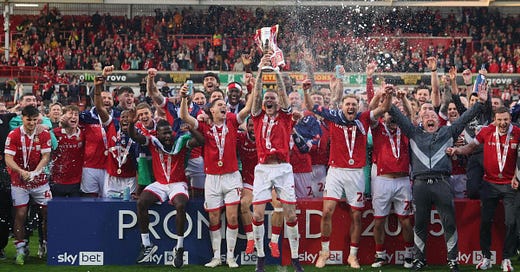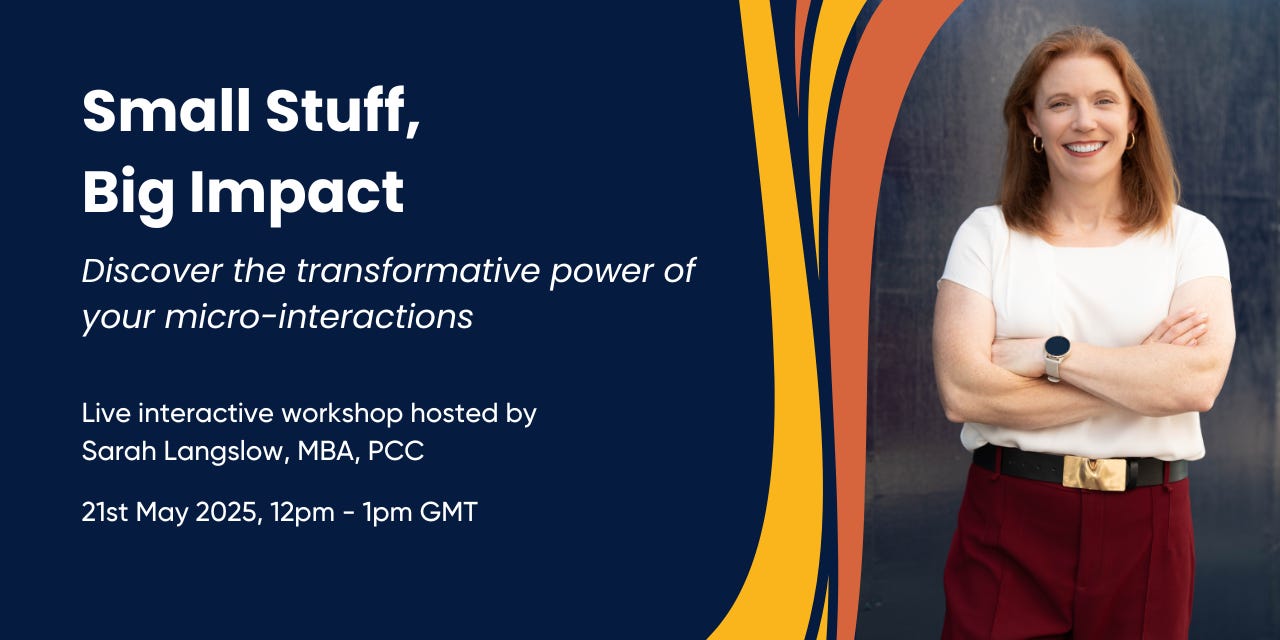What are you playing for?
When we commit to something bigger, we unlock both the results and a different experience of achieving them
Our relationship to results – the mindset we hold around them – has a quiet but powerful influence. It shapes not only whether we produce the results we’re aiming for, but also our experience of the journey itself. In other words, how we feel, how we show up, and who we become along the way.
This is one of those pieces of ‘small stuff’ that carries big impact. The lens through which we view results informs our behaviours, and our behaviours drive outcomes. If we believe something is possible, we’ll usually find a way to keep going. If we don’t, we tend to hold back, or quietly stop trying.
When we bring awareness to our current mindset around results, we give ourselves access to something far more empowering. Something that works with us, rather than against us. Something that fuels momentum rather than drains it. And the path to this often starts by naming where we are now.
Let’s explore in a little more depth.
When our relationship to results gets in the way
From a disempowered place, our relationship to results tends to fall on a spectrum. On one end, attachment, on the other, resignation.
Attachment shows up when we feel we have to achieve a certain outcome – where anything less feels like failure. We fear the consequences of falling short, so we push harder. We stress, we overwork, we get trapped in proving mode, and our energy is tense and urgent. There might be bursts of productivity, but we’re rarely enjoying ourselves. It’s a brittle way to operate, and it’s not sustainable.
At the other end of the spectrum lies resignation. Here, we’ve quietly decided it’s not possible, or that we aren’t willing to push through when it feels tough. So we retreat, we accept the status quo, and we talk ourselves out of the vision or decide it’s just too hard. We might still be doing the job, but the fire’s gone out. This tends to breed impatience, frustration, and a chronic lack of motivation.
While these two modes seem opposite, they often stem from the same source: fear. Attachment is driven by a fear of not achieving – of what might happen if we fall short. Resignation carries a quieter fear – the fear of what it might mean about us if we go all in and still don’t get there. What would others think? What judgments would we make of ourselves?
While either mindset might still yield some results, they rarely leave us feeling fulfilled or energised. Ultimately, they’re no fun at all.
A more empowered place: commitment
In contrast, commitment offers us a more generative way of relating to results. Commitment is about playing for something – being willing to keep going, even when it’s hard, because we said we would.
It’s not blind optimism or naïve positivity, it’s grounded. It acknowledges that bumps, setbacks and wrong turns are part of the journey. But the focus remains on the end result – the one that matters enough to keep showing up for.
From commitment, we don’t need the process to be perfect, nor do we expect it to be linear. We allow for experimentation, for mistakes, for learning. There’s a certain freedom here, even playfulness. Because when we’re not gripped by fear or doubt, we can be creative, we can take risks and move with more lightness.
And we don’t need to prove anything. We’re not driven by pressure or shame or the need to be seen as successful.
Let me use a sporting example to make this real. You may have heard of Wrexham AFC – a formerly non-league football team made globally famous by the documentary Welcome to Wrexham. Their goal over the last few seasons has been to earn promotion, initially into the national leagues and then beyond. In their first attempt, despite high hopes and serious effort, they fell short. But they didn’t stop. They learned, they re-committed, they went for it again the following season – and this time, they won promotion.
What stood out wasn’t just the result but the spirit behind it. The resilience which bred the willingness to take a deep breath and go again. That’s the power of commitment.
What does this mean for you?
If you want to experience results differently – with more energy, more momentum, and more meaning – start with your own commitment. Here are three small steps to begin.
One. Name your commitment
What are you committed to – for real? Not the surface-level goals, but the deeper, motivating result. What do you care enough about to go all in for? This might be a tangible target. But it might also be a cultural shift. A way of leading. A change you want to see in your team or organisation. If it doesn’t feel big enough, go deeper. Ask yourself: What’s the bigger game I want to play?
Two. Look at your actions
Are your day-to-day actions and behaviours broadly aligned with that commitment? To be clear, this isn’t about perfection. But, be honest: are you doing the things that move you forward – even when they’re uncomfortable or unglamorous? If not, what small adjustment would get you back on track?
Three. Stay present to your commitment
Find a way to keep your commitment front of mind. Write it down. Post it somewhere visible. Set a reminder. Create a visual cue. The goal is to interrupt your patterns – especially on the hard days. To remind yourself: this matters. And you’re willing to keep playing for it.
Leadership, at its heart, is a commitment game. Not just to results – but to the people, the purpose, and the impact we want to create. When we lead from commitment rather than attachment or resignation, we access a different energy. A different level of resourcefulness. And often, a very different result.
So – what are you playing for?
Hit reply or let me know in the comments. And if you’re up for it, share what you’re taking from this that you’re going to practise.
Thanks to Accomplishment Coaching for some of the concepts described in this Substack.
Meme of the week
Here’s one commitment I’m absolutely up for😂
Join me for the next Small Stuff, Big Impact workshop
The next Small Stuff Big Impact Workshop will be on 21st May at 12pm BST. I’d love for you to join me, and share this with any of your friends and colleagues who might be interested in attending.
Unlock the hidden power of small, everyday interactions with "Small Stuff, Big Impact: Discover the transformative power of micro-interactions" – this live, online (and complimentary) workshop will introduce you to the world of micro-interactions – those small, seemingly inconsequential moments that have a profound impact on your team’s engagement and performance. If you’re leading or managing others, mastering these moments is essential to building stronger relationships and creating a more motivated, connected team.
In this 60-minute introductory workshop, you will:
🌟 Learn what micro-interactions are and why they matter in leadership.
🌟 Discover how small adjustments in communication, tone, and behaviour can create a ripple effect, transforming your daily interactions into powerful tools for engagement.
🌟 Learn how to translate theory into action – you will leave with practical suggestions to start making subtle but effective changes right away.
Register for your place via this link, and please do share with anyone you know who might like to join.
Places are limited to ensure a truly interactive discussion, so sign up now to avoid missing out.
See you there!
Thanks for reading, and I’ll see you next week!
If you know someone who you think would enjoy this, use this button to share it with them directly. Thank you!






